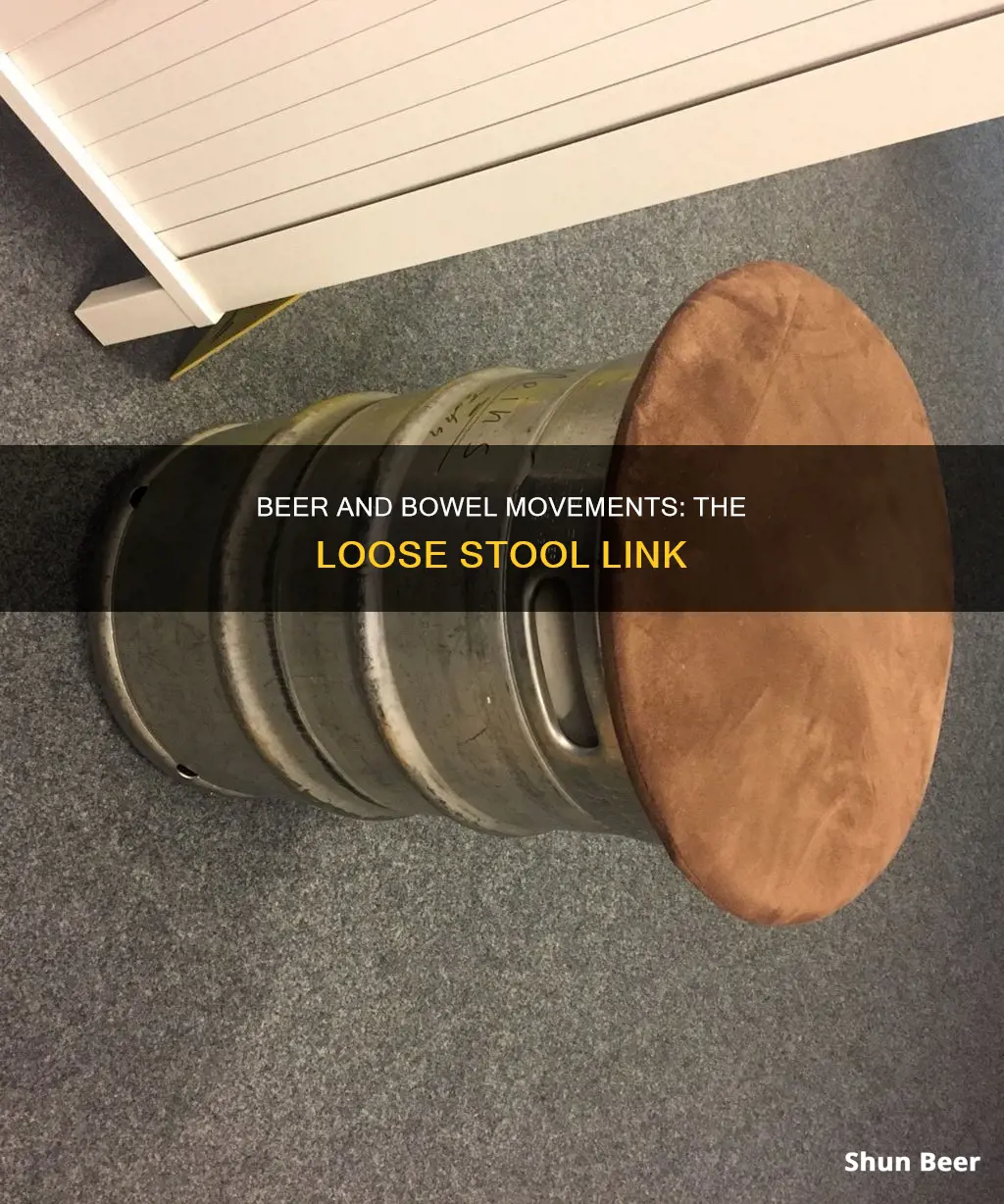
Alcohol can have a significant impact on the digestive system, and drinking beer is no exception. Ethanol, found in alcoholic beverages, accelerates the digestive process, often resulting in a quicker urge to defecate. This acceleration leaves less time for the colon to absorb water, leading to watery stools or diarrhoea. Beer, in particular, with its high carbohydrate content, can be challenging for the body to break down, especially when consumed in large quantities. This challenge results in an increased likelihood of loose stools as the body struggles to process the excess carbohydrates. Additionally, the gluten found in beer can irritate the gut, causing further digestive issues for those with gluten sensitivity.
| Characteristics | Values |
|---|---|
| Alcohol's effect on the digestive system | Alcohol can irritate the lining of the intestines, causing inflammation and speeding up digestion. |
| Diarrhea causes | Alcohol can lead to intestinal contractions that are stronger and more frequent, resulting in loose stools. |
| Role of ethanol | Ethanol in alcohol accelerates the digestive process, reducing water absorption in the colon and leading to watery stools. |
| Carbohydrates in beer | The high volume of carbohydrates in beer can overwhelm the body's ability to break them down, leading to digestive issues. |
| Gut bacteria | Alcohol can kill good gut bacteria, leading to an imbalance that impairs the intestines' ability to absorb water. |
| Dehydration | Alcohol prevents the body from reabsorbing water, and excessive drinking can lead to dehydration, resulting in constipation. |
| Individual differences | The impact of alcohol on digestion varies between individuals, with some people experiencing diarrhea while others have no issues. |
| Food consumption | Eating before drinking can reduce alcohol's effect on the intestines by slowing down the absorption process. |
What You'll Learn
- Beer has more carbohydrates than other alcoholic drinks, which can be difficult for the body to break down
- Alcohol can irritate the intestines, causing them to leak fluid and contract more frequently
- Alcohol can kill good gut bacteria, leading to an imbalance
- Alcohol can cause inflammation in the gastrointestinal tract
- Drinking on an empty stomach can cause loose stools as there is no food to slow down alcohol absorption

Beer has more carbohydrates than other alcoholic drinks, which can be difficult for the body to break down
Once in the large intestine, the resident bacteria will break down these remaining carbohydrates through fermentation. This process produces gas, which can lead to cramping and diarrhoea. The presence of excess carbohydrates in the large intestine can also cause an imbalance in the gut bacteria, with certain species being killed off or allowed to grow rapidly. This can impair the intestines' ability to absorb water, leading to looser stools.
Additionally, the high carbohydrate content of beer may further irritate the gut in individuals with gluten sensitivity or problems absorbing carbohydrates. This irritation can contribute to the diarrhoea experienced after drinking beer.
To reduce the likelihood of diarrhoea after consuming beer, it is recommended to drink in moderation and to alternate alcoholic beverages with plain water. Staying hydrated can help dilute the alcohol and carbohydrates in the system, reducing their potential negative effects on the digestive system.
Pizza Hut's Beer Delivery: How Does It Work?
You may want to see also

Alcohol can irritate the intestines, causing them to leak fluid and contract more frequently
Alcohol can cause inflammation of the gastrointestinal tract, which can lead to irritation and changes in water absorption, resulting in diarrhoea. Alcohol can also speed up the movement of food through the intestines, not allowing enough time for proper digestion. This faster digestion is caused by the irritation and inflammation of the intestines, which can be exacerbated by heavy drinking or binge drinking.
The large intestine is usually responsible for pulling liquids out of the stool before passing it out of the body. However, when alcohol is present, the large intestine does not function as well, resulting in liquid stools. This is because alcohol increases the permeability of the intestinal lining, allowing pathogens and other harmful substances to enter the bloodstream. This can lead to a "leaky gut", where bacteria and toxins can enter the bloodstream and cause further inflammation.
Alcohol can also affect the balance of bacteria in the intestines, leading to an overgrowth of harmful bacteria. This bacterial imbalance can cause an increase in endotoxins, which can further irritate the intestines and contribute to inflammation.
In addition, alcohol can interfere with the absorption of nutrients in the small intestine and increase the transport of toxins across the intestinal walls. This can have detrimental effects on the liver and other organs.
Beer and Sawan: A Cultural Perspective
You may want to see also

Alcohol can kill good gut bacteria, leading to an imbalance
Alcohol can have a detrimental effect on the balance of bacteria in the gut microbiome, causing a state of dysbiosis. The gut microbiome is made up of a vast array of bacteria, microbes, viruses, and fungi, which are essential to supporting the immune system, metabolism, and regulating inflammation. When we drink alcohol, it passes through the digestive system, impacting the gut microbiome.
Alcohol can cause an imbalance in the gut microbiome by killing off good bacteria. This can lead to inflammation and a "leaky gut", where the protective mucus layer of the intestinal lining is compromised, allowing toxins to enter the bloodstream. This can have a range of negative health consequences, including liver damage, an increased risk of cancer, and a weakened immune system.
The impact of alcohol on the gut microbiome can be mitigated by drinking in moderation, never drinking on an empty stomach, and choosing quality alcoholic beverages that are less likely to affect the microbiome, such as high-quality tequila or red wine. Additionally, taking probiotic supplements can help restore gut health after drinking.
Vegan Beer: What's in Your Pint Glass?
You may want to see also

Alcohol can cause inflammation in the gastrointestinal tract
Drinking beer can cause loose stools, and alcohol is known to affect the digestive system in various ways. One of the main ways is by causing inflammation in the gastrointestinal tract.
Alcohol can irritate the lining of the intestines, leading to inflammation and affecting their normal functions. This irritation can cause the intestines to leak fluid into the gut, and the muscle contractions become stronger and more frequent. These contractions trigger the urge to defecate as they move waste through the system. The increased frequency of contractions may result in waste being pushed out before the intestines can absorb enough water, leading to loose and watery stools.
The inflammation caused by alcohol can also impair the intestines' ability to absorb fluid properly. This results in too much fluid exiting the body and not enough being absorbed, contributing to diarrhoea. The irritation caused by alcohol further exacerbates this issue.
Additionally, alcohol can stimulate the production of acid in the stomach, which can also lead to increased irritation and inflammation in the gastrointestinal tract. This increased acid production can have a cascading effect, causing further issues with digestion and absorption.
The effects of alcohol on the gastrointestinal tract are complex and vary from person to person. However, it is clear that alcohol can cause inflammation in the gastrointestinal tract, which can lead to loose stools and other digestive issues.
Beer and Xarelto: Is It Safe to Drink?
You may want to see also

Drinking on an empty stomach can cause loose stools as there is no food to slow down alcohol absorption
Alcohol can also negatively impact the intestines' ability to absorb fluid, leaving the stool in a pre-dehydrated state. This is worsened by the fact that alcohol is a diuretic, which means the body produces more urine, and the drinker will be consuming more liquid than usual. This can lead to dehydration, which can be life-threatening.
The large intestine usually pulls liquid out of the stool before it is passed out of the body. However, when alcohol is present, the large intestine does not function as well, and liquid stools can be the result. This is because alcohol affects the normal functions of the digestive system at every stage. As well as speeding up digestion, alcohol can cause inflammation and irritation, and can kill off good bacteria in the gut, leading to a bacterial imbalance.
The effects of alcohol on the digestive system can be mitigated by eating before drinking. Food in the stomach acts as a buffer, slowing the rate of alcohol absorption. This means that less alcohol will reach the small intestine, and the large intestine, where it can affect the colon and cause loose stools and diarrhoea.
Beer Drinking: Harmful Health Effects You Need to Know
You may want to see also
Frequently asked questions
Beer contains more carbohydrates than other alcoholic drinks, and the body struggles to break these down while processing alcohol. This can lead to loose stools.
Drinking alcohol can irritate the lining of the intestines, causing them to leak fluid and making their contractions stronger and more frequent. This can result in loose stools.
It is recommended to stick to the daily limit of no more than two drinks per day. Alternating each alcoholic drink with plain water can also help to prevent loose stools.
It is advised to eat before drinking alcohol, as this can slow down the absorption of alcohol into the body. Drinking water or herbal teas can also help to prevent dehydration, which can be caused by alcohol.
If loose stools persist for more than a couple of days, it is recommended to consult a doctor. If there are any signs of dehydration, such as dizziness or dark urine, medical attention should be sought.







